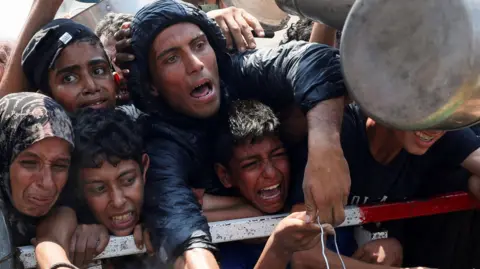Israel says it will open humanitarian routes to allow aid convoys into Gaza

BBC News
 Reuters
ReutersIsrael’s military says it will open humanitarian corridors to allow aid convoys into the Gaza Strip, after weeks of mounting international pressure and warnings of starvation.
In a statement on Sunday, the Israel Defense Forces (IDF) also announced what it called a “local tactical pause in military activity” for humanitarian purposes in three areas.
It came after Israel said it made an airdrop of aid into Gaza of “seven packages of aid containing flour, sugar and canned food”.
There have been growing calls for Israel to let more aid into Gaza following months of limited supply to the territory’s two million people. Israel denied what it called “the false claim of deliberate starvation” in Gaza.
Palestinian officials are yet to comment on the plan for humanitarian corridors, or on the reported airdrop into Gaza.
On Sunday, the Hamas-run health ministry said six more people had died from malnutrition, bringing the number since the start of the conflict to 133, with the majority dying in recent weeks.
The IDF said it would open humanitarian corridors for aid convoys in Gaza to allow the UN and other organisations to deliver food and medicine to Palestinians across the strip. The routes would be in place from 06:00 to 23:00 local time (04:00 BST to 21:00 BST).
The pause in military activity would take place in three areas – Al Mawasi, Deir al-Balah and Gaza City – from 10:00 to 20:00 local time (08:00 BST to 18:00 BST) each day until further notice, the IDF added.
The UN and other aid organisations, alongside some of Israel’s allies, have blamed the country for a growing food crisis in Gaza, and have called for the unrestricted entry and delivery of aid.
Tom Fletcher, the UN’s humanitarian chief, said the humanitarian pause for aid was a welcome announcement.
He added: “In contact with our teams on the ground who will do all we can to reach as many starving people as we can in this window.”
At least nine Palestinians were killed and 54 others wounded in an Israeli shooting as civilians gathered at an aid convoy route in central Gaza, according to medical officials on Sunday. The IDF has been approached for comment.
The spokesman of al-Awda Hospital in Nuseirat said the victims were brought to its site.
Photographs on Sunday showed lorries carrying aid queuing at Gaza’s Rafah border with Egypt, awaiting access into the territory.
The World Health Organization (WHO) chief, Tedros Adhanom Ghebreyesus, described the food crisis in Gaza as “man-made mass starvation”.
The IDF said that responsibility for food distribution to the population in Gaza “lies with the UN and international aid organisations” and added they must “ensure that the aid does not reach Hamas”.
Earlier on Sunday, the IDF said an aid airdrop “was carried out in co-ordination with international organisations and led by Cogat”, referring to the Israeli military body which oversees the entry of aid into Gaza.
The military also posted a video purportedly showing a plane dropping the aid. The footage has not been independently verified.
Late on Saturday, the Israeli military also stated that it had resumed supplying power to a desalination plant in Gaza, which it said would “serve about 900,000 residents”.
Israel cut off all supplies to Gaza from the start of March, and resumed with new restrictions in May.
Along with the US, it backed the Gaza Humanitarian Foundation (GHF) and allowed it to operate in Gaza.
There have been almost daily reports of Palestinians being killed while seeking aid since the GHF began operations in late May. Witnesses have told the BBC most have been shot by Israeli forces. Israel has said that its troops fire warning shots and has disputed reported death tolls. It accuses Hamas of instigating chaos near the aid points.
Israel’s apparent concessions followed its acceptance of a Jordanian and UAE plan, backed by the UK, to air drop aid into Gaza. Aid agencies however said such moves would do little to mitigate the hunger of Gazans.
The head of the UN’s Palestinian refugee agency Unrwa, Philippe Lazzarini, said air drops were “expensive, inefficient, and can even kill starving civilians” if they did not go according to plan.
Lazzarini said his organisation had “the equivalent of 6,000 trucks” in Jordan and Egypt waiting to enter Gaza, and urged Israel “lift the siege, open the gates and guarantee safe movements and dignified access to people in need”.
The BBC spoke to several Gazans on Saturday who worried air drops could cause “serious harm”.
One man living in the north of the strip told BBC Arabic’s Middle East Daily that the process was “unsafe” and “caused numerous tragedies” when similar relief efforts were attempted last year.
“When aid is dropped from the air, it risks landing directly on tents, potentially causing serious harm, including injury or even death,” he said.
Meanwhile, Palestinians are battling dehydration along with starvation. One mother told the BBC she was “living with no food or drink, no food, no bread, not even water.”
Israel launched a war in Gaza in response to the Hamas-led attack on southern Israel on 7 October 2023, in which about 1,200 people were killed and 251 others were taken hostage.
More than 59,000 people have been killed in Gaza since then, according to the Hamas-run health ministry.
Source link

